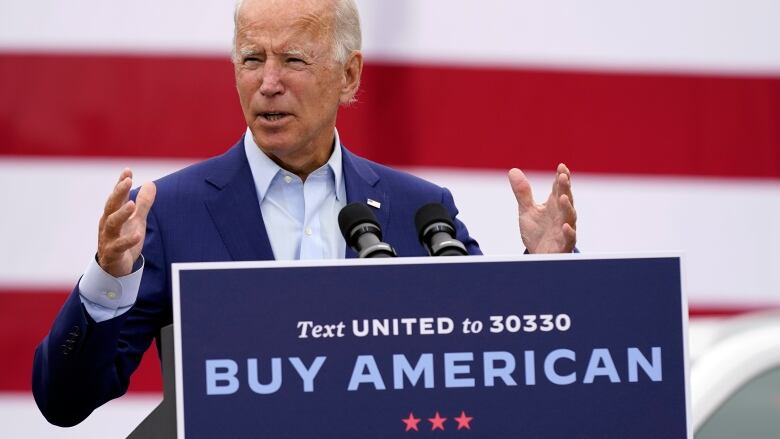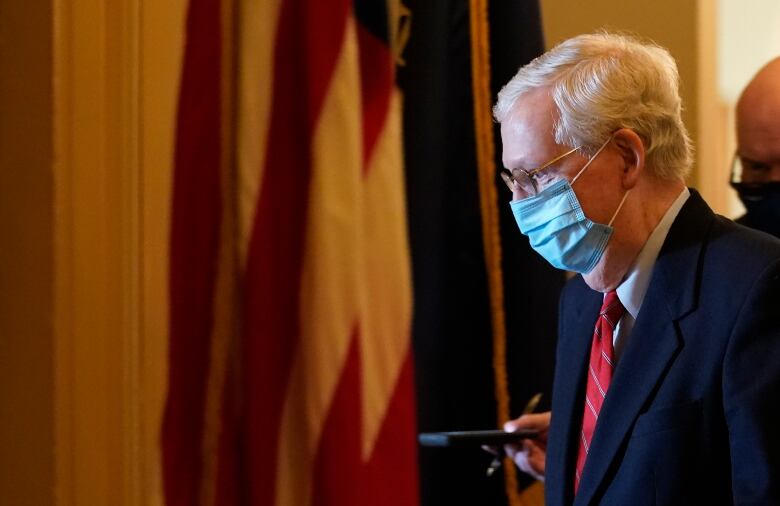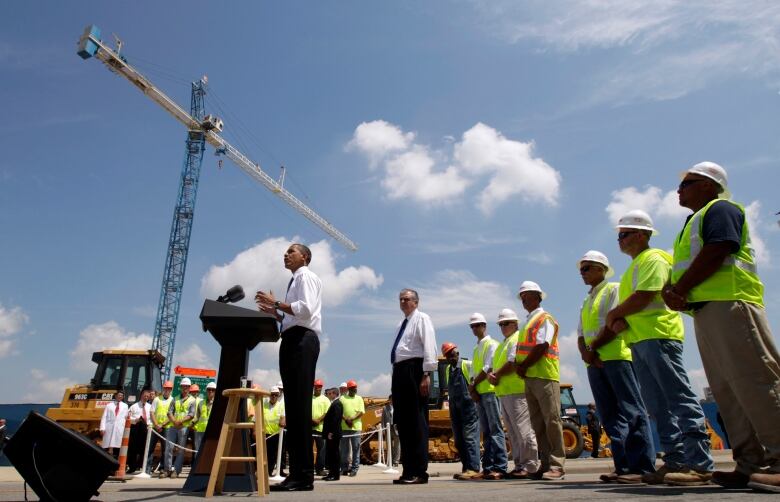How big a deal is Joe Biden's Buy American pledge? Here's what to watch for
These upcoming decisions will reveal if Biden's plan has the teeth to bite Canada's economy

Is the Buy American pledge from incoming U.S. president Joe Biden a nothingburger or a potential billion-dollar blow to Canada's economy?
It could go either way.
The actual scope of Biden's insistence on buying American goods and what it means in practice will be revealed with several events in the new year.
What we do know is that Biden this week reiterated his plan to launch a massive construction program, and his intention to award contracts only to U.S. companies.
That pledge underscores that international trade tensions won't all magically disappear with the departure of Donald Trump from the White House.
WATCH | What a Biden presidency could mean for Canada:
But when it comes to "buy local" rules, the devil is in the eye-glazing details. And few people know these details better than former U.S. trade negotiator Jean Heilman Grier.
In a career with the U.S. government spanning a quarter-century, she negotiated numerous agreements on procurement with other countries, including an important one with Canada, the 2010 pact that exempted Canadians from some Buy American rules.
"[Biden]'s a strong supporter of Buy American," said Heilman Grier, now a consultant working outside government.
"The question is: what's he going to do with that?"
We'll start getting answers in January right after a pair of Senate races in Georgia that will determine which party controls the Senate.
Will there even be abig infrastructure plan?
Biden's proposed $2-trillion US clean infrastructure plan is the crown jewel of his campaign pledge to drive down greenhouse gas emissions.
It also hints at possible riches for energy, transportation and construction companies that will all want a slice of that staggering sum of cash.
Yet there's no guarantee it will ever happen.
Passing any landmark bill through Congress tends to be challenging let alone one that comes with a 13-digit price tag.
Now add another possible hurdle: Senate Republicans.

We'll learn on Jan. 5 whether Biden's Democrats will control the U.S. Senate and the party that controls the Senate decides what bills are even allowed for a vote.
If Democrats lose either of two Georgia elections that day, Republicans will retain the majority, and Republican Leader Mitch McConnell will decide which bills get voted on.
One Canada-U.S. trade expert says he expects both parties will want to do something on infrastructure. But the details are far from settled.
"I think we are going to see some kind of infrastructure [bill]. The size and scope remain to be determined," Dan Ujczo of the law firm Dickinson Wright said from Ohio.
"It ain't gonna be in the first 100 days [of the next administration]."
What about trade deals?
Once we see the bill, it's time to read the fine print. Specifically: Will any such bill reference international trade agreements, and promise to comply with them?
Canada and the U.S. have some free-trade deals on procurement.
There's the World Trade Organization agreement on federal contracts. In addition, some state and provincial departments are covered under the WTO deal's Annex 2. There are also separate agreements on military contracts.
Canada received approximately $674 million worth of contracts from the U.S. government in 2015, out of $12.1 billion handed out in total to foreign firms, according to a 2019 paper by U.S. federal researchers.
So Canada and other countries would scour any future bill for references to these agreements and see whether they would be respected.

Biden knows this terrain well.
He played a role in the last major infrastructure bill that kicked off a Buy American kerfuffle: the $900-billion stimulus package in 2009.
In that bill, a version that passed the U.S. House of Representatives included no reference to trade agreements; the Senate later added a clause about respecting international trade deals.
Biden was the Obama administration's point person in implementing that controversial 2009 stimulus package.
"He was kind of [leading] that through the Congress," said Heilman Grier, who predicted a future bill would respect trade agreements.
"I would expect you would see that kind of provision in any infrastructure bill."
One legacy of that 2009 Buy American dispute was a pact between Canada and the U.S. that made it easier for some state and provincial agencies to award contracts to companies across the border.
But there are still numerous gaps.
Where are the gaps?
Whether an infrastructure project is covered by trade deals depends on where federal funds are spent. Federal money flows to states and cities and the rules are completely spotty, with different standards for departments in different places.
If Canadians want to understand why that is, we can start by glancing in the mirror.
Canadian provinces have refused to open some of their big agencies to free trade in procurement, such as Hydro-Qubec and Infrastructure Ontario.
Toronto trade lawyer Mark Warner says Canadians love to complain about procurement protectionism, but are far from blameless.

"If your starting position is, 'You, United States, open everything and we open virtually nothing,' it's really hard to see how you progress from that," Warner said in an interview.
Heilman Grier, who negotiated the 2009-10 agreement for the U.S., said the Americans could be brought back to the table if Canada offered something.
"If [Canada] came and said, 'We'll give you [access] to Hydro-Quebec if you gave us the [U.S. power utilities] then we could have a conversation," she said.
"That's a question for Canada."
But Heilman Grier said she can't imagine such a reform happening in the next few months, as it would require complex and politically fraught negotiations between Washington and state governments.
Lawyer Ujczo cited another limitation to free trade in procurement: fear.
He said some Americans will just be too scared to use foreign suppliers. That includes companies looking for subcontractors, and buyers for state and local governments, who worry about the law and figure it's safer just to buy locally.
"To me, Buy American is always more about the perception than the reality," Ujczo said.
What else might Biden do?
Heilman Grier anticipates a few other Buy American actions from Biden. She said he could further tighten some of the many executive orders signed by Trump.
For example, Trump has proposed increasing by several percentage points how much American content different products must have in order to qualify as a U.S. good.
In a Biden-Harris administration, Buy American will be more than a slogan.
Were going to invest an additional $400 billion in purchasing American-made products and keep good-paying jobs here at home. https://t.co/HrOOkXerMP
—@JoeBidenThe rule, which has not yet taken effect, would increase the current threshold of 50 per cent for most products to 55 per cent American content, with a far more dramatic increase for iron and steel products.
Heilman Grier said Biden could toughen it further. She also said the incoming president's team might also be looking at tightening exemptions to Buy American rules.
For example, a U.S. buyer can work around those rules by claiming that a certain product isn't available domestically.
She said American manufacturers can already challenge that claim for contracts awarded by the U.S. Department of Transportation; that sort of rule could be extended to other departments.
The bottom line? Buy American rules aren't going away.
WATCH | Biden vowed to 'make America respected around the world again' in his victory speech:
Free-market purists can do all the finger-wagging they want about comparative advantage, and they can point out that these rules lead to higher costs for taxpayers, but it won't change that political reality, Ujczo said.
"You're really rolling the stone uphill if you're trying to [complain about] Buy American," Ujczo said.
"What you need to do is find exemptions, exclusions and side deals."
How Canada can succeed
Ujczo's advice to Canada is twofold, but based on the same principle: slide in by repositioning "Buy American" as "Buy North American."
First, Canadians should get in early and try convincing the U.S. government to take a Buy North American approach to pandemic-related medical gear. COVID-19 is what Washington is currently focused on.
Months from now, when the attention shifts to infrastructure, Ujczo said Canada can ask to replicate the same Buy North American approach there.
He said Canada's big public-private investors could also offer to help fund U.S. projects, and tie funding to certain conditions such as a Buy American exemption.















_(720p).jpg)


 OFFICIAL HD MUSIC VIDEO.jpg)
.jpg)



























































































